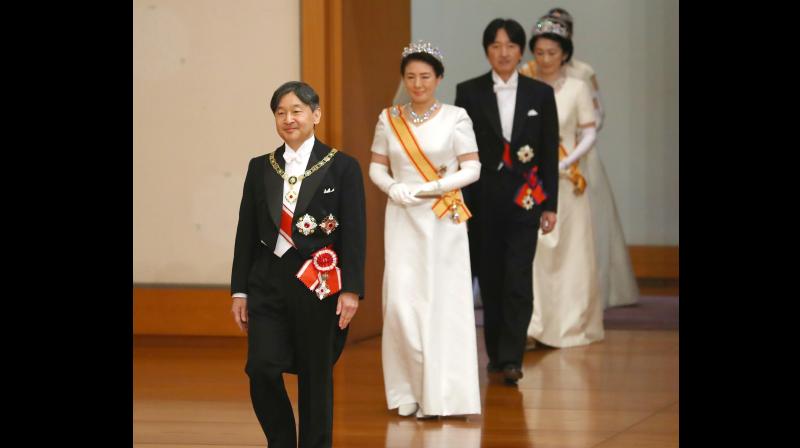New Japanese Emperor Naruhito ascends Chrysanthemum throne
Japan\'s new Emperor Naruhito formally ascended the Chrysanthemum Throne, a day after his father\'s historic abdication.

Tokyo: Japan's new Emperor Naruhito formally ascended the Chrysanthemum Throne on Wednesday, a day after his father's historic abdication, and vowed to stand with the people as the country begins a new imperial era.
In a brief address, his first to the nation since inheriting the throne, Naruhito vowed to "act according to the Constitution" while "always turning my thoughts to the people and standing with them".
Naruhito officially became emperor at the stroke of midnight but the process was formalised in the ritual on Wednesday morning, which was off-limits to female royals - even his wife Masako.
The emperor entered the Imperial Palace's Pine Room in formal Western clothing and a heavy gold chain of office, accompanied by male family members including his brother Akishino.
The 59-year-old was presented with the items his father Akihito relinquished a day earlier: sacred imperial treasures of a sword and a jewel, as well as the seal of state and his personal imperial seal.
The sole woman invitee was the only female member of Prime Minister Shinzo Abe's cabinet.
The ceremony took place on the first day of the new imperial era of Reiwa, meaning "beautiful harmony", which will last throughout Naruhito's reign.
Shortly afterwards, Empress Masako arrived by car at the palace in a diamond-studded tiara to join Naruhito, the nation's 126th emperor.
He said he would "reflect deeply" on the example set by his popular father Akihito, and that assuming the throne filled him with a "sense of solemnity".
Abe, replying on behalf of the people, said: "We are determined to create a bright future for a proud Japan filled with peace and hope at a time when the international situation is changing dramatically."
After heavy rain dampened celebrations for the abdication on Tuesday, Japanese took advantage of sunnier weather to flock to the Meiji Shrine in the heart of the capital where free sake was served ahead of a display of horseback archery.
Naruhito will make his first public appearance on Saturday when he will again address the people of Japan.
But the real pomp and ceremony will wait until October 22 when he and Masako will appear in elaborate traditional robes for a ceremony in the palace before parading through the streets of the capital to be congratulated by a host of world leaders and royals.
Naruhito will greet his first foreign head of state as emperor later this month, when US President Donald Trump visits Japan to meet the new monarch.
The Oxford-educated Naruhito faces the delicate balancing act of continuing his father's legacy of bringing the monarchy closer to the people while upholding the centuries-old traditions of the Chrysanthemum Throne.
Like his popular father Akihito, he has warned of the need to remember World War II "correctly," without downplaying Japan's early 20th-century militarism.
He has also spoken of the need to modernise the royal family, and vowed when he married Masako -- who left behind a promising diplomatic career -- to protect her "at any cost".
She has struggled, however, to adjust to palace life, including being subjected to enormous pressure to produce a male heir, and has suffered stress-induced "adjustment disorder" for much of their marriage.
The couple have one child, a 17-year-old daughter called Aiko, who cannot inherit the throne because she is female.
In a statement released on her birthday in December, Masako pledged to do her best despite feeling "insecure" about becoming empress.
In the candid statement, she said she was recovering and could "perform more duties than before", crediting the "powerful support" of the public.
Naruhito is ascending the throne in a very different Japan to the one his father took over when he became emperor in 1989.
Then, Japan ruled the world economically, its technology was the envy of every industrialised nation, and its stock market was at highs unlikely to be matched again.
But following a "lost decade" after the bubble burst, Japan is locked in a battle against deflation and sluggish growth while its population ages rapidly.
Akihito's abdication, the first in 200 years, has resulted in an unprecedented 10-day public holiday for the famously hard-working Japanese, with many taking advantage of the break to travel.
But despite the holiday exodus, and steady driving rain on Tuesday night, crowds still gathered at Tokyo's famous Shibuya crossing at the clock struck midnight to welcome the Reiwa era.
"The emperor was a good person... He was the symbol of Japan," said Rika Yamamoto, a 24-year-old company employee sheltering under an umbrella on the crossing.
"I hope the new emperor will carry on the kindness the old emperor had."

